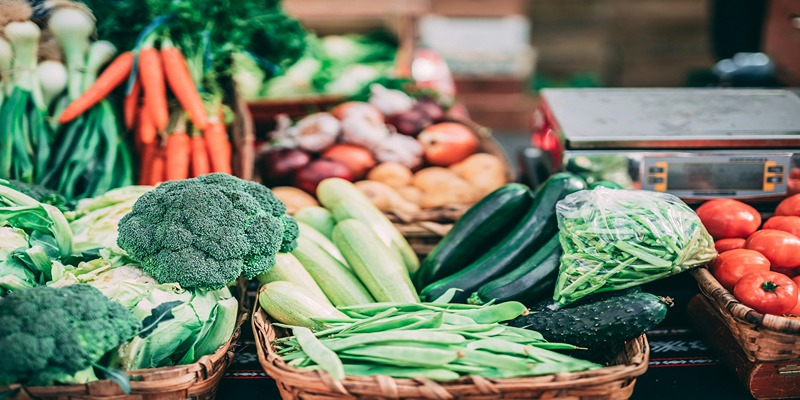Selecting the Best Vegetables for Effective Low-Carb Diets
Dec 02, 2023 By Nancy Miller
The possible benefits of low-carb diets for weight reduction and general health have garnered a lot of interest. Reducing carbohydrate consumption and increasing protein and healthy fat consumption are the main tenets of these eating plans. The importance of veggies becomes more apparent in this setting. As a source of vital nutrients, dietary fiber, and several health advantages, they play a significant role in low-carb diets. In this article, we will discuss the basics of low-carb diets and how veggies fit into this eating plan. Learn how veggies may improve your health and help you lose weight by serving as the foundation of low-carb meals that are both filling and healthy.

Optimal Low-Carb Veggies: What to Include
As part of a well-rounded low-carb diet, low-carb veggies are essential since they have several qualities that help people cut down on carbs.
Produce with a low net carbohydrate content is known as low-carb veggies. Because fiber is incompletely digested and has little effect on blood sugar levels, it is necessary to deduct it from total carbohydrates in order to get net carbs. These veggies are great for those who are watching their carb consumption but still want a range of healthy alternatives.
On top of that, low-carb veggies are a great source of fiber. For more than one reason, this fiber content is good for you. Consistent bowel motions and good gut health are benefits of improved digestion. Dietary fiber has additional weight management benefits since it makes you feel fuller for longer, which in turn helps curb your hunger and cut down on calories.
Vegetables with few carbohydrates are rich in fiber and other beneficial elements, and they have few net carbohydrates as well. The antioxidants, vitamins, and minerals they contain are good for your health in general. Vitamins A and K abound in leafy greens like kale and spinach, while cruciferous veggies like broccoli and cauliflower provide a wealth of other minerals.
For the best low-carb foods, try cruciferous veggies, bell peppers, zucchini, and leafy greens. Vegetables like these not only help keep carbs to a minimum, but they also jazz up your meals with taste and minerals.
In terms of nutrition, these veggies are great for more than just cutting carbs. In addition to helping with appetite management, they also increase fullness, which means you could eat fewer calories overall. In addition, they contribute to general health and wellness by providing vitamins and minerals that are necessary for a number of body processes.
If you want to acquire all the nutrients you need without consuming too many carbohydrates, eat plenty of low-carb veggies. They make a low-carb diet more interesting and delicious by enhancing the nutritional value of your food while also adding variety and taste.
Vegetables to Avoid on a Low-Carb Diet
Identifying High-Carb Vegetables
Vegetables that are rich in carbs have a comparatively greater carbohydrate content than those that are low in carbohydrate content. These veggies usually have a lot of natural sugars or are starchy.
A vegetable that is rich in carbohydrates is the potato. As a common vegetable, potatoes are heavy in carbs and carbohydrates. Spikes in blood sugar levels are caused by the quick conversion of starch into glucose in the body.
You should also be wary of sweet potatoes because of their high carbohydrate content. Although sweet potatoes are healthy, they have more carbohydrates than veggies that aren't starchy. They have a higher carbohydrate content because they have more natural sugars. Some vegetables, like corn, are heavy in carbohydrates. A low-carb diet might be limited since it is starchy and has a lot of carbohydrates. Like many other legumes, peas are a kind of high-carb vegetable. They are higher in carbs than the majority of veggies that aren't starchy.
Reasons to Limit or Avoid These Vegetables
On a low-carb diet, the carbohydrate content of vegetables is the main reason to limit their consumption. Vegetables like these may add a lot of carbs to your diet, which isn't great if you're trying to cut down. Extremely low-carb diets often aim to induce ketosis, which may be hindered by consuming a high-carbohydrate diet. Consumption of starchy vegetables, such as sweet potatoes and potatoes, may cause a quick increase in blood sugar levels. individuals trying to maintain steady blood sugar levels, individuals with insulin resistance or diabetes may find this troublesome. Corn is one example of a high-carb vegetable that is also rich in calories. Therefore, they may impede weight loss efforts as they add more calories to the diet than low-carb veggies.

Low-Carb Vegetable Guide: Meal Planning and Preparation
Tips for Incorporating Low-Carb Vegetables into Meals
When shopping for low-carb veggies, one important thing to remember is to choose a variety. You can keep your meals varied and entertaining while still getting all the nutrients you need if you choose a variety of foods. Incorporate more leafy greens, cruciferous veggies (broccoli, cauliflower, etc.), and colorful veggies (zucchini, bell peppers, etc.) into your diet. Not only does this type improve the tastes, but it also offers other health advantages.
Swapping out high-carb foods for low-carb ones is another smart move. Spiralized zucchini noodles and cauliflower rice are two healthy alternatives to regular pasta and rice. These alternatives not only make your meals more healthy, but they also enhance their texture and taste while reducing carbohydrate consumption.
In addition, low-carb veggies should be a staple in your diet. You may easily add these vegetables to your meals at any meal of the day. Start your day off well by topping your omelet with spinach or kale. For lunch, try roasted broccoli. And for supper, try sautéing bell peppers and mushrooms for a tasty side dish. You may be confident that you will get the advantages of low-carb veggies all day long with this continuous inclusion.
Ideas for Meal Planning and Preparation
Efficiently preparing and organizing your meals will help you eat more vegetables, which are low in carbohydrates. Make a point to prepare your veggies for the week ahead by setting aside some time at the start of each day. Prepare them by washing, chopping, and storing them in containers that are appropriate for serving sizes. Not only will this make your week go more smoothly, but it will also guarantee that you always have nutritious alternatives on hand.
Another great approach to integrating low-carb veggies is to make one-pot or one-pan meals. Vegetables and protein sources, such as chicken or tofu, are cooked together in one pot or on a baking sheet in these recipes. It just takes a few minutes to season with your preferred herbs and spices, roast or simmer, and you'll have a healthy and easy meal on the table.
A wide range of low-carb veggies may be easily used in stir-fries. Toss your preferred veggies with lean proteins such as shrimp, tofu, or chicken in a big pan or wok. To make a fast and filling dinner, just add spices and sauces with taste.
Creative Ways to Enjoy Low-Carb Veggies
Finding new and interesting ways to consume low-carb veggies may liven up your meals. To bring out the best in your vegetables, try a variety of sauces and dressings. For example, you may grill some asparagus and drizzle it with a creamy tahini sauce or top it with roasted cauliflower. These sauces take your veggie recipes to the next level with their one-of-a-kind flavors.
To add a smokey, burnt taste to low-carb veggies, grilling or barbecuing is a great option. Grilling veggies is a certain way to have them cooked to perfection. Grill them in a little olive oil until they are soft and slightly caramelized, then top with your preferred spices. Incorporating these roasted vegetables into salads and sandwiches enhances their taste and makes for a delicious side dish.
Trying out vegetarian noodles is another unique idea. A spiralizer is a useful kitchen appliance for slicing veggies like sweet potatoes, zucchini, and carrots into noodles. You may use these "noodles" as a foundation for all sorts of things. As a low-carb substitute for regular spaghetti, they are great in salads and stir-fries.
Conclusion
Low-carb vegetables are a valuable addition to a balanced diet, offering both nutritional benefits and culinary versatility. By diversifying your selection of low-carb veggies and creatively incorporating them into your meals, you can enjoy delicious and satisfying dishes while supporting your low-carb lifestyle. Meal planning and preparation strategies, such as prepping vegetables in advance and exploring one-pot meals, can streamline your cooking process and make healthy eating more convenient. Embracing these tips and ideas ensures that low-carb vegetables play a central role in promoting both your dietary goals and overall well-being.








